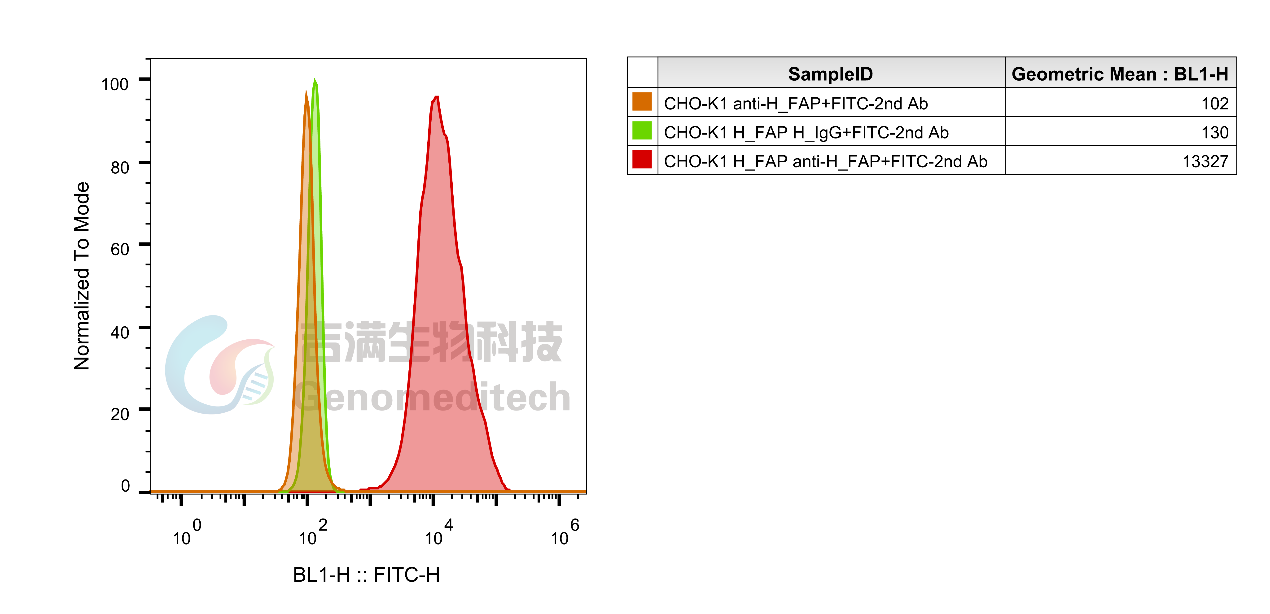Cat. No:GM-30156AB
Product:Anti-H_FAP hIgG1 Antibody(Simlukafusp)
Cat. No:GM-30156AB
Product:Anti-H_FAP hIgG1 Antibody(Simlukafusp)
GM-30156AB-10 10 μg
GM-30156AB-100 100 μg
GM-30156AB-1000 1mg
Species Reactivity Human
Clone Simlukafusp
Source/Isotype Monoclonal Human IgG1, κ
Application Flow Cytometry
Specificity Detects FAP
Gene FAP
Other Names FAPA; SIMP; DPPIV; FAPalpha
Gene ID 2191
Background FAP is a 760 amino acid long type II transmembrane glycoprotein. It contains a very short cytoplasmic N terminal part (6 amino acids), a transmembrane region (amino acids 7–26), and a large extracellular part with an alpha/beta-hydrolase domain and an eight-bladed beta-propeller domain. FAP is catalytically active as a 170 kD homodimer and has a dipeptidase and an endopeptidase activity. FAP expression is high in reactive stromal fibroblasts of epithelial cancers, granulation tissue of healing wounds, and malignant cells of bone and soft tissue sarcomas. FAP is thought to be involved in the control of fibroblast growth or epithelial-mesenchymal interactions during development, tissue repair, and epithelial carcinogenesis.
Storage Store at 2-8℃ short term (1-2 weeks).Store at ≤ -20℃ long term. Avoid repeated freeze-thaw.
Formulation Phosphate-buffered solution, pH 7.2.
Endotoxin < 1 EU/mg, determined by LAL gel clotting assay

Cat. No:GM-30156AB
Product:Anti-H_FAP hIgG1 Antibody(Simlukafusp)
GM-30156AB-10 10 μg
GM-30156AB-100 100 μg
GM-30156AB-1000 1mg
Species Reactivity Human
Clone Simlukafusp
Source/Isotype Monoclonal Human IgG1, κ
Application Flow Cytometry
Specificity Detects FAP
Gene FAP
Other Names FAPA; SIMP; DPPIV; FAPalpha
Gene ID 2191
Background FAP is a 760 amino acid long type II transmembrane glycoprotein. It contains a very short cytoplasmic N terminal part (6 amino acids), a transmembrane region (amino acids 7–26), and a large extracellular part with an alpha/beta-hydrolase domain and an eight-bladed beta-propeller domain. FAP is catalytically active as a 170 kD homodimer and has a dipeptidase and an endopeptidase activity. FAP expression is high in reactive stromal fibroblasts of epithelial cancers, granulation tissue of healing wounds, and malignant cells of bone and soft tissue sarcomas. FAP is thought to be involved in the control of fibroblast growth or epithelial-mesenchymal interactions during development, tissue repair, and epithelial carcinogenesis.
Storage Store at 2-8℃ short term (1-2 weeks).Store at ≤ -20℃ long term. Avoid repeated freeze-thaw.
Formulation Phosphate-buffered solution, pH 7.2.
Endotoxin < 1 EU/mg, determined by LAL gel clotting assay
